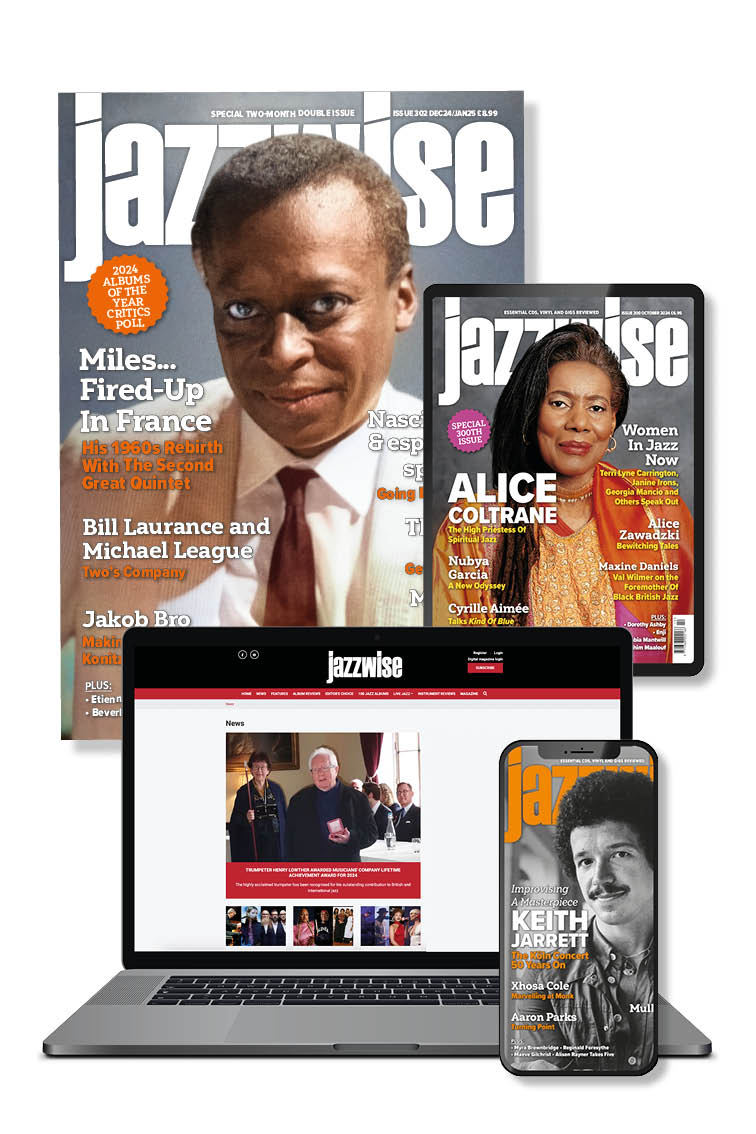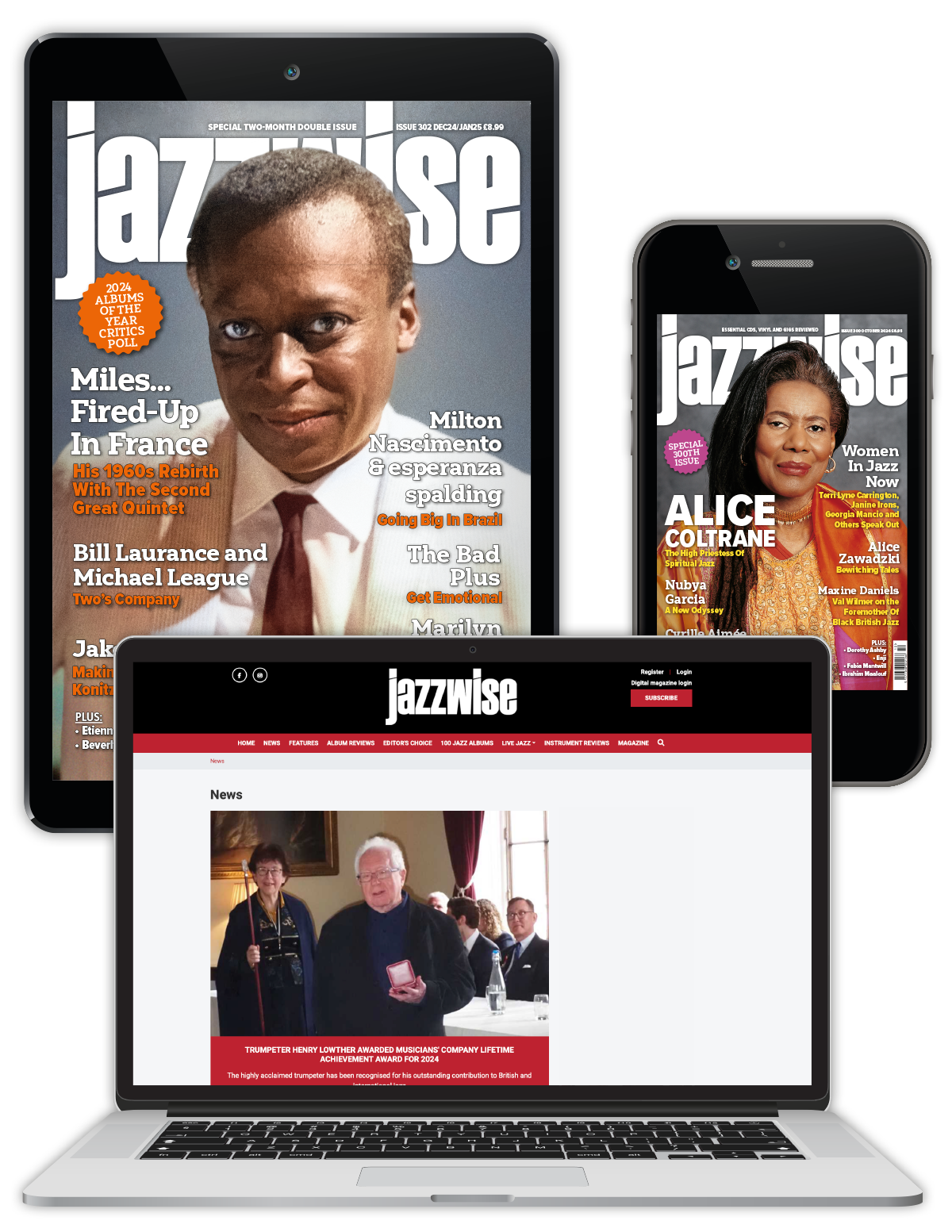Miles Davis: Miles Davis Miles At The Fillmore. Miles Davis 1970: The Bootleg Series Vol.3
Editor's Choice
Author: Jon Newey
View record and artist detailsRecord and Artist Details
Musicians: |
Miles Davis |
Label: |
Columbia Legacy |
Magazine Review Date: |
April/2014 |
Catalogue Number: |
4CD Set |
RecordDate: |
17-20 June 1970, bonus cuts 11 April 1970 |
“Bill and I got along all right, but we had our disagreements because Bill is a tough motherfucking businessman, and I don't take no shit, either. So there were clashes,” said Miles Davis about Fillmore boss Bill Graham, in his autobiography Miles in 1989. And clashes there were, particularly when Miles showed up late every night when opening for Neil Young at the Fillmore East in March 1970. Yet there was also mutual respect between these two masters of their game: a pair of the most forwardlooking, yet toughest and most uncompromising operators in the music business. Graham loved Miles’ music, and Davis dug how Graham was creatively opening up his two Fillmore venues by being the first to book jazz alongside rock. A move which fired the awareness and appreciation of jazz by young hip audiences more than at anytime since, and sold thousands of extra albums for Miles as well.
Their relationship was less tense in June 1970 when Graham booked Davis for a four night stay at Fillmore East to open for fellow Columbia signing, singer-songwriter Laura Nyro, herself a big Davis fan. As with his previous Fillmore appearances Columbia were on hand to record the performances, this time however they used an eight-track recorder rather than four-track. Originally released in October 1970 as a double vinyl set, Miles Davis At Fillmore, this was Miles the high priest of provocation, bringing his mould-breaking Bitches Brew concepts out of the studio into the high-volume rock ballrooms, creating new music in the moment whose shock waves are still being felt today.
Out on the street it was a time of huge social change, the counter culture was on the march, a new consciousness was dawning, equality and civil rights were a daily battleground, and over it all hung Vietnam. Inside the Fillmore, Miles’ new music echoed this tense, technicolour turmoil with uninterrupted hour-long sets each night that were unparalleled in Art Blakey their intensity, aggression and seat-edge tension. The problem was Columbia wouldn't agree to a four LP set, only a double album despite Miles’ wish that all the music be released. Producer Teo Macero edited each night down to fit an LP side thus losing half the music with editing so brutal it would have shocked his local butcher. Sadly it destroyed the flow and development and became completely unrepresentative of what Miles and the band were creating live. Furthermore each LP side was titled ‘Wednesday Miles’, ‘Thursday Miles’ etc, with no indication of the actual tunes played.
Now, with the release of Miles At The Fillmore. Miles Davis 1970: The Bootleg Series Vol.3, the full performances from each night can be heard for the first time on this breathtaking 4CD set containing 100 extra minutes of previously unheard music, plus three unreleased bonus tracks from his April 1970 shows at Fillmore West, including a turbo-charged ‘Miles Runs the Voodoo Down’. Reissue producers Richard Seidel and Michael Cuscuna have remixed the original eight-track tapes resulting in a sound quality of far superior clarity, detail and depth compared to both the original vinyl and its 1995 CD release. Make no mistake, this music is a revelation. Miles is on peerless form and the band, as I personally witnessed weeks later, is an absolute beast. Keith Jarrett had just come onboard playing organ alongside Chick Corea's Fender Rhodes, and both fed their keyboards through ring modulators and wah wah pedals creating beautifully raw, almost alien analogue textures. The difference the additional keyboard made was staggering, adding a density and turbulence to the sound as Miles guided each set through a medley based around ‘Directions’, ‘The Mask’, It's About That Time’, ‘Bitches Brew’ and ‘The Theme’. He was conducting a sonic laboratory on stage, letting the experiment run as this shape shifting kinetic force ventured out to new frontiers each night. Jarrett and Corea were positioned on opposite sides of the stage and had trouble hearing each other, resulting in a constant outpouring of ideas that snaked around and rebounded off each other, creating a whirling vortex of sound. Whether by design or accident these keyboard ‘battles’ delighted Miles and fed his hunger for constant change and unpredictability and proved a core characteristic of this short-lived line-up.
Opening each night with Joe Zawinul's ‘Directions’ the level of energy from the get-go is astonishing. Over Dave Holland's robust grooving pulse and Airto's nagging cuica, Jack DeJohnette is in bristling heavyweight mode, punching out an unstoppable polyrhythmic barrage of tom fills and cymbal smashes that connect with and propel Miles’ blistering lines, slurs and staccato phrases towards the towering theme. More muscle is flexed as trumpet and keys go head to head while Holland anchors with hooky two and three note bass figures before the brooding atmospheric soundscape of ‘The Mask’ descends to a darker, ominous mood. Miles guides each overlapping transformation into the next piece through coded phrases and cues as ferocious one chord vamps morph into fragile melancholic passages reminiscent of Sketches of Spain, where his glacial stillness and hushed articulation are masterpieces of divine elegance. Steve Grossman is also heard to much more positive effect here than the original edited version, with a coruscating tenor onslaught on the lone encore ‘Spanish Key’, while his flute calms the raging squalls for ‘I Fall In Love Too Easily’. Yet for all the music's unequalled drive and ferocity, Miles’ use of space is absolutely key to the rich musicality and its ability to draw the listener deep inside: the delicate beauty in the heart of darkness. Miles has got his wish at last.

Jazzwise Full Club
- Latest print and digital issues
- Digital archive since 1997
- Download tracks from bonus compilation albums throughout the year
- Reviews Database access
From £9.08 / month
Subscribe
Jazzwise Digital Club
- Latest digital issues
- Digital archive since 1997
- Download tracks from bonus compilation albums during the year
- Reviews Database access

